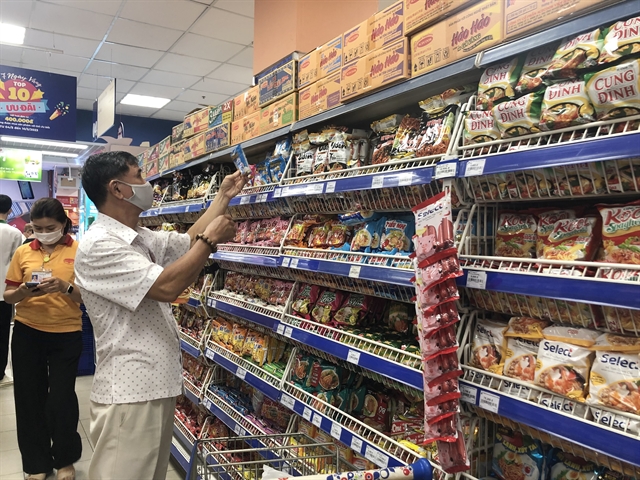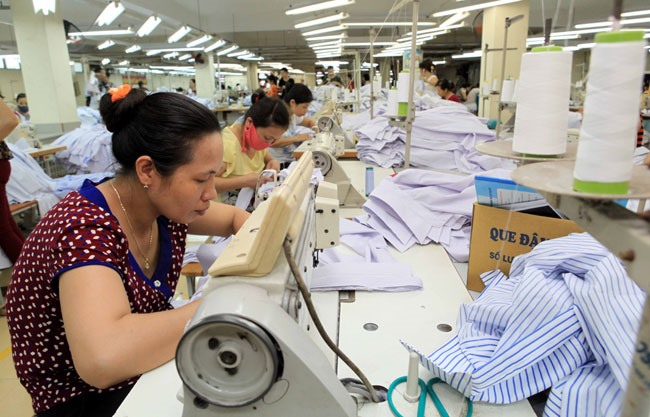 Economy
Economy

Domestic firms should make great efforts in the competition with foreign invested firms to contribute more actively to the global value chain and participate more effectively in the world’s production network, experts said.
 |
| Sài Đồng Garment Company works produce shirts for export to the US, the EU and Japan. The government is urging domestic firms to make great efforts in the competition with foreign invested firms to contribute more actively to the global value chain and participate more effectively in the world’s production network. — VNA/VNS Photo Trần Việt |
HÀ NỘI — Domestic firms should make great efforts in the competition with foreign invested firms to contribute more actively to the global value chain and participate more effectively in the world’s production network, experts said.
Central Institute for Economic Management (CIEM) former director Lê Đăng Doanh told Người Lao Động (The Labourer) newspaper that foreign direct investment (FDI) firms had greatly contributed to Việt Nam’s economic growth, accounting for around 70 per cent of national export turnover while domestic enterprises had not yet deeply involved in the global value chain.
According to the General Statistics Office, in 2016, Việt Nam’s export turnover reached over US$175 billion, up 8.6 per cent year-on-year. Of the estimate, the export value earned by FDI enterprises reached more than $120 billion, up 10.2 per cent against the previous year.
Doanh said domestic enterprises had been urged to improve capacity and enhance competitiveness right when the contribution of FDI firms in the export value was standing at 50 per cent. However, until now, when the rate had risen to 70 per cent, local firms still remained passive in global value chains.
Export over the years contributed greatly to the economy - if in 2001, the national export turnover reached $15 billion, then 10 years later, the number rose up to $97 billion, Doanh said, adding that this achievement was largely achieved by the FDI sector.
The significant presence of FDI companies in exports partly reflected the low level of competitiveness exhibited by domestic businesses, he said, adding that a major part of Vietnamese firms were just joining in the low value outsourcing service industries.
According to Ngô Đức Hòa, chairman of Thắng Lợi Textile Garment JSC, all of Thắng Lợi’s products serving domestic use are self-designed, produced and distributed. But for the exported goods, the company just provides “cut and sew” services for foreign partners, meaning that the firm creates apparel and accessories out of materials owned by the foreign companies that contract them.
The biggest difficulty textile exporting enterprises is facing is the lack of raw materials for production, leading to the only option of importation. In addition, Việt Nam’s textile and garment industry hasn’t thrived yet, thus gaining low attention from customers.
Due to the fact that the firm is only hired to “cut and sew” products for foreign partners, they have to use raw materials supplied by the partners or import the materials themselves. If an exported T-shirt costs $10, the company has to spend $8.5 to import materials and earn only $1.5 for processing services.
"It is not an exaggeration to say textile enterprises pinch pennies for a living," Hòa said.
Even for high-technology industries such as power, electronic and telecommunication, most of domestic enterprises are hired for providing outsourcing services for exported goods.
According to Vũ Thành Tự Anh from Fullbright Teaching Program, a recent research of Fullbright’s specialist group summarising the 10-year period that Intel invested in Việt Nam showed a number of sad results.
Tự Anh said Vietnamese enterprises account for only 3 per cent of Intel’s total exporting value and are involved in some steps of meals provision, gift boxes preparation and security services, which are the services that Intel can’t import.
Mobilising all sources for domestic enterprises
At the recent Prime Minister’s roundtable conference with global specialist network on Việt Nam’s development, Prof. Trần Văn Thọ from Japan-based Waseda University said in the context that Việt Nam was actively and thoroughly integrating in the world’s economy, avoiding the “outsourcing trap” was a significant challenge, drawing high attention of policy makers.
According to Doanh, Việt Nam’s economy strongly depending on the FDI sector may become alarming issue as when the economic advantages vanish, the FDI capital flow may be diverted to other countries. This is actually what’s happening with our textile industry as outsourcing service orders are shifting to Cambodia and Bangladesh.
In a bid to improve the situation, the country’s policies need to focus on developing agricultural production, which have already strongly contributed to the national economy, on a larger scale so that the agriculture sector can participate more deeply in the global value chain
The government also needs to concentrate on the development of the supporting industry to enable private enterprises to join in production chains of big corporations such as Samsung and Intel.
“We must create more motivation for private enterprises to actively produce rather than gaining profit through the investment in property and resources exploitation," Doanh said.
Regarding tax issue, economic expert Bùi Trinh said input VAT levied on FDI enterprises were deducted.
“Meanwhile, many Vietnamese enterprises whose input VAT should have been deducted still has to pay for it. How are domestic industries, such as agriculture, supposed to grow and compete when they still have to pay for input VAT?” Trinh said.
Trinh said the government’s policies assisting domestic enterprises should begin with concrete actions such as reducing taxes, reconsidering tax policy to guarantee fairness between FDI and domestic enterprises. — VNS